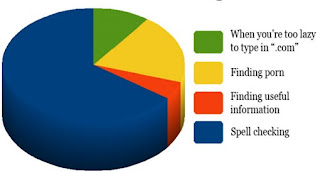GOOGLE:
PROTECTING USER DATA FROM THE GOVERNMENT.
QUESTION 1:
How did Google’s stance provide the company with an advantage over its competition?
Google upholds the position as the dominant search engine in the world, with 65 percent of the total search market, according to Hitwise. To maintain Google's competitive advantage, the company has developed an infrastructure that guarantees a fast and efficient search engine, as well as branching out their efforts in other directions beyond search. Moreover, a new feature in the software allows users to “Search across Computers” to find information stored on multiple networked computers. This capability is made possible by having Google index personal files in its own database.
Let’s first examine the speed of an average Google search. Any random search takes between 0.06 to 0.12 seconds (Gigaom). Google’s competitive edge is traced to the fact that they’ve built their own infrastructure of servers, storage systems, bandwidth and hardware that supports the fastest search on the web.
While the cost for the company is high, as Google spends billions of dollars in development and upkeep, this competitive strategy builds a formidable wall for other general search engines, such as Bing (formerly MSN Search) which is merging with Yahoo!. At the same time, the cost of building the advanced infrastructure is an investment for Google to ensure that the cost of conducting a query keeps going down.
Google's advantage over competitors is its rapid speed that keeps users coming back. The results of the search may vary, but because of the incredible speed, a user can search another key phrase with minimal sacrifice and therefore be less inclined to switch to a competitor.
Let’s first examine the speed of an average Google search. Any random search takes between 0.06 to 0.12 seconds (Gigaom). Google’s competitive edge is traced to the fact that they’ve built their own infrastructure of servers, storage systems, bandwidth and hardware that supports the fastest search on the web.
While the cost for the company is high, as Google spends billions of dollars in development and upkeep, this competitive strategy builds a formidable wall for other general search engines, such as Bing (formerly MSN Search) which is merging with Yahoo!. At the same time, the cost of building the advanced infrastructure is an investment for Google to ensure that the cost of conducting a query keeps going down.
Google's advantage over competitors is its rapid speed that keeps users coming back. The results of the search may vary, but because of the incredible speed, a user can search another key phrase with minimal sacrifice and therefore be less inclined to switch to a competitor.
 Not only does Google provide a fast search, but the company also employs tools and services such as the Google toolbar, Google Maps, Google Earth and Google News. The toolbar presents a way for users to conduct a search without leaving their homepage. It also simplifies navigation by recounting the most searched-for web pages by each user. Services such as Google Maps and Google News provide another type of support on top of the general search engine.
Not only does Google provide a fast search, but the company also employs tools and services such as the Google toolbar, Google Maps, Google Earth and Google News. The toolbar presents a way for users to conduct a search without leaving their homepage. It also simplifies navigation by recounting the most searched-for web pages by each user. Services such as Google Maps and Google News provide another type of support on top of the general search engine.
Google has also expanded to mobile phones with the Android operating system, which delivers Google services and features as mobile applications. These strategies allow for Google to reach out to consumers and create a competitive advantage.
Google’s competitive advantage is it provides an incredibly fast search and tools to support the general search engine. Competing search engines such as Bing or Yahoo! would have to develop their infrastructure to match the speed and comprehensiveness that Google possesses.
Reference:
SMART ADVANTAGE BLOG
Available from: http://blog.smartadvantage.com/competitive-advantage-blog/bid/44872/How-Google-Maintains-Its-Competitive-Advantage.[Accessed on 17/05/2012]
Done By: Khairul
-------------------------------------------------------------------------------------------------------------------------------------
QUESTION 2:
What risk did Google take in not initially complying with government requests?
 Google is one of the most popular engines that maintain huge databases filled with information on billions of Web sites. If
they did not take initially complying with government requests, Google
might have to face some possible risk with the government.
Google is one of the most popular engines that maintain huge databases filled with information on billions of Web sites. If
they did not take initially complying with government requests, Google
might have to face some possible risk with the government.
 Google
can be fine by the government if they not being cooperative from the
internet companies. Google lawyer Nichole Wong also mentions that she
wrote on the company’s web site that the government will send a clear
massage regarding privacy and Google must stick with the government
privacy.
Google
can be fine by the government if they not being cooperative from the
internet companies. Google lawyer Nichole Wong also mentions that she
wrote on the company’s web site that the government will send a clear
massage regarding privacy and Google must stick with the government
privacy.
Google Transparency Report
Available from: http://www.google.com/transparencyreport/removals/government/DoneBy:Nazmi
-----------------------------------------------------------------------------------------------------------------------------------
 Google
is multinational publicly traded organization built around company
which popular search, cloud computing, advertising technologies and Web
app, browser and operating system development. Google was chosen for its
resemblance to the word googol a number consisting of a numeral one
followed by a hundred zeroes as a reference to the vast amount of
information in the world. Google's stated the mission is "to organize
the world's information and make it universally accessible and useful."
This mission and the means used to accomplish it have raised concerns
among the company's critics.
Google
is multinational publicly traded organization built around company
which popular search, cloud computing, advertising technologies and Web
app, browser and operating system development. Google was chosen for its
resemblance to the word googol a number consisting of a numeral one
followed by a hundred zeroes as a reference to the vast amount of
information in the world. Google's stated the mission is "to organize
the world's information and make it universally accessible and useful."
This mission and the means used to accomplish it have raised concerns
among the company's critics.
 Therefore
in my opinion, Google was supporting and obstructing justice because
they have a lot of user includes us that we used every time when we
doing research. Google and the other search companies also maintain
private detailed information that includes the specific searches. The
customer put a lot of trust on them. If the government knows all about
this, our privacy will not save the government will knows everything our
details. They won’t to give the privacy information to the government,
but the government has the rights to get the information from Google. By
getting information from Google it can help the government to find the
terrorist or criminals by using IP addresses.
Therefore
in my opinion, Google was supporting and obstructing justice because
they have a lot of user includes us that we used every time when we
doing research. Google and the other search companies also maintain
private detailed information that includes the specific searches. The
customer put a lot of trust on them. If the government knows all about
this, our privacy will not save the government will knows everything our
details. They won’t to give the privacy information to the government,
but the government has the rights to get the information from Google. By
getting information from Google it can help the government to find the
terrorist or criminals by using IP addresses.
 By
right, every company such as Google, Microsoft, Mozilla Firefox and etc
have their main objective was to cater to the the customer's needs i.e
providing services without in need of exposing identity. Their online
customer are mostly being treated as anonymous. Take for example where
Microsoft wants to know their customers data, they will tell the user
that "you will be known as anonymous". This is very important for
customers because they value their privacy.
By
right, every company such as Google, Microsoft, Mozilla Firefox and etc
have their main objective was to cater to the the customer's needs i.e
providing services without in need of exposing identity. Their online
customer are mostly being treated as anonymous. Take for example where
Microsoft wants to know their customers data, they will tell the user
that "you will be known as anonymous". This is very important for
customers because they value their privacy.
When the government wants to take part "to force a legitimate business", many customers would be against it because as the statement above says 'Customers value their privacy.' I personally do not support when the government is trying to get information from the means of violating the users' personal information. It is as if someone you don't know barges into your house and checks your belongings as tells you that "this is official business."
Yes, it is true that they want to provide security for the entire country but human value their privacy even as human.While the right to privacy is a fundamental human right in itself, it also informs and supports other human rights. The principle of non-discrimination and the right to equality may be impacted by violations of the right to privacy. For example, this may occur where the sharing of personal information with governments triggers discrimination on the basis of discriminatory local laws and/or practice.The right to privacy is closely linked to and may impact the freedom of expression. An example of this is where internet providers share information about dissidents with an authoritarian government and subsequent government action leads to human rights violations.

Further, the freedom of association may be impacted for instance when personal information about trade union affiliation is shared with governments, particularly when the affected individual experiences state-sanctioned discrimination and other human rights violations. Other human rights which may be impacted include: freedom of thought, conscience and religion; freedom of assembly; the right to physical integrity; the right to liberty and security; the right to equality; and the right to health.
 This
means that when the privacy is broken, the companies will lose its
customers, in which means they wil lose their income. When government is
given the right to go through for example Google's customers' private
information, people would believe that they have no more privacy, which
also means that government does not support its citizens' views and
respect their private lives. This could be leading to unwanted riots and
protests.
This
means that when the privacy is broken, the companies will lose its
customers, in which means they wil lose their income. When government is
given the right to go through for example Google's customers' private
information, people would believe that they have no more privacy, which
also means that government does not support its citizens' views and
respect their private lives. This could be leading to unwanted riots and
protests.
References:
What risk did Google take in not initially complying with government requests?
 Google is one of the most popular engines that maintain huge databases filled with information on billions of Web sites. If
they did not take initially complying with government requests, Google
might have to face some possible risk with the government.
Google is one of the most popular engines that maintain huge databases filled with information on billions of Web sites. If
they did not take initially complying with government requests, Google
might have to face some possible risk with the government.
Google,
whose corporate slogan is “Don’t Be Evil,” complained that providing
such information to the government would be detrimental to the trust
that users place in the company. Google’s acceding to the request would suggest that it is willing to reveal information about those who use its services. This
is not a perception Google can accept. And one can envision scenarios
where queries alone could reveal identifying information about a
specific Google user, which is another outcome that Google cannot accept.
The
federal judge in the Google case ruled that Google was required to give
the government addresses of 50,0000 randomly selected Web sites indexed
by its search engine but not any personal information on Google users.
The ruling was considered to be a significant victory for Google and
privacy rights advocates. “We will always be subject to government
subpoenas, but the fact that the judge sent a clear message about
privacy is reassuring, “Google lawyer Nicole Wong wrote on the company’s
web site. “What his ruling means is that neither the government nor
anyone else has carte blanche when demanding data from Internet
companies”.
 Google
can be fine by the government if they not being cooperative from the
internet companies. Google lawyer Nichole Wong also mentions that she
wrote on the company’s web site that the government will send a clear
massage regarding privacy and Google must stick with the government
privacy.
Google
can be fine by the government if they not being cooperative from the
internet companies. Google lawyer Nichole Wong also mentions that she
wrote on the company’s web site that the government will send a clear
massage regarding privacy and Google must stick with the government
privacy.
Reference:
Google Transparency Report
Available from: http://www.google.com/transparencyreport/removals/government/DoneBy:Nazmi
-----------------------------------------------------------------------------------------------------------------------------------
QUESTION 3:
Do you feel Google was supporting or obstructing justice in its refusal to give up private information to its government? Why?
 Google
is multinational publicly traded organization built around company
which popular search, cloud computing, advertising technologies and Web
app, browser and operating system development. Google was chosen for its
resemblance to the word googol a number consisting of a numeral one
followed by a hundred zeroes as a reference to the vast amount of
information in the world. Google's stated the mission is "to organize
the world's information and make it universally accessible and useful."
This mission and the means used to accomplish it have raised concerns
among the company's critics.
Google
is multinational publicly traded organization built around company
which popular search, cloud computing, advertising technologies and Web
app, browser and operating system development. Google was chosen for its
resemblance to the word googol a number consisting of a numeral one
followed by a hundred zeroes as a reference to the vast amount of
information in the world. Google's stated the mission is "to organize
the world's information and make it universally accessible and useful."
This mission and the means used to accomplish it have raised concerns
among the company's critics.
While
competitors are targeting the individual applications Google has
deployed, Google is building a massive, general purpose computing
platform for web-scale programming. Criticism of Google includes
possible misuse and manipulation of search results, its use of others'
intellectual property, concerns that its compilation of data may violate
people's privacy, censorship of search results and content, and the
energy consumption of its servers as well as concerns over traditional
business issues such as antitrust, monopoly, and restraint of trade.
 Therefore
in my opinion, Google was supporting and obstructing justice because
they have a lot of user includes us that we used every time when we
doing research. Google and the other search companies also maintain
private detailed information that includes the specific searches. The
customer put a lot of trust on them. If the government knows all about
this, our privacy will not save the government will knows everything our
details. They won’t to give the privacy information to the government,
but the government has the rights to get the information from Google. By
getting information from Google it can help the government to find the
terrorist or criminals by using IP addresses.
Therefore
in my opinion, Google was supporting and obstructing justice because
they have a lot of user includes us that we used every time when we
doing research. Google and the other search companies also maintain
private detailed information that includes the specific searches. The
customer put a lot of trust on them. If the government knows all about
this, our privacy will not save the government will knows everything our
details. They won’t to give the privacy information to the government,
but the government has the rights to get the information from Google. By
getting information from Google it can help the government to find the
terrorist or criminals by using IP addresses.
In
conclusion, it is better that Google won’t give any information to the
government because if it happen some companies will give the information
to the government but with condition the government have to pay the
information that the companies give and it will make some profit for
that companies. Well, if this happen the customer will not trust to keep
their information to Google because they can’t keep the private
information.
References:
Margaret Rouse (2011) Google
Available from: http://searchcio-midmarket.techtarget.com/definition/Google,
[Accessed on 20nd July 2012]
Margaret Rouse (2011) Google
Available from: http://searchcio-midmarket.techtarget.com/definition/Google,
[Accessed on 20nd July 2012]
Done By: Sufi
-------------------------------------------------------------------------------------------------------------------------------------
QUESTION 4:
As based on the example in the case study, in your opinion the government have the right to force a legal business to take action that might damage its relationship with its customers? What does this say about the action of the government? Do you support this and do you think that citizens will support this action?
 By
right, every company such as Google, Microsoft, Mozilla Firefox and etc
have their main objective was to cater to the the customer's needs i.e
providing services without in need of exposing identity. Their online
customer are mostly being treated as anonymous. Take for example where
Microsoft wants to know their customers data, they will tell the user
that "you will be known as anonymous". This is very important for
customers because they value their privacy.
By
right, every company such as Google, Microsoft, Mozilla Firefox and etc
have their main objective was to cater to the the customer's needs i.e
providing services without in need of exposing identity. Their online
customer are mostly being treated as anonymous. Take for example where
Microsoft wants to know their customers data, they will tell the user
that "you will be known as anonymous". This is very important for
customers because they value their privacy.When the government wants to take part "to force a legitimate business", many customers would be against it because as the statement above says 'Customers value their privacy.' I personally do not support when the government is trying to get information from the means of violating the users' personal information. It is as if someone you don't know barges into your house and checks your belongings as tells you that "this is official business."
Yes, it is true that they want to provide security for the entire country but human value their privacy even as human.While the right to privacy is a fundamental human right in itself, it also informs and supports other human rights. The principle of non-discrimination and the right to equality may be impacted by violations of the right to privacy. For example, this may occur where the sharing of personal information with governments triggers discrimination on the basis of discriminatory local laws and/or practice.The right to privacy is closely linked to and may impact the freedom of expression. An example of this is where internet providers share information about dissidents with an authoritarian government and subsequent government action leads to human rights violations.

Further, the freedom of association may be impacted for instance when personal information about trade union affiliation is shared with governments, particularly when the affected individual experiences state-sanctioned discrimination and other human rights violations. Other human rights which may be impacted include: freedom of thought, conscience and religion; freedom of assembly; the right to physical integrity; the right to liberty and security; the right to equality; and the right to health.
 This
means that when the privacy is broken, the companies will lose its
customers, in which means they wil lose their income. When government is
given the right to go through for example Google's customers' private
information, people would believe that they have no more privacy, which
also means that government does not support its citizens' views and
respect their private lives. This could be leading to unwanted riots and
protests.
This
means that when the privacy is broken, the companies will lose its
customers, in which means they wil lose their income. When government is
given the right to go through for example Google's customers' private
information, people would believe that they have no more privacy, which
also means that government does not support its citizens' views and
respect their private lives. This could be leading to unwanted riots and
protests.
References:
Available from: http://human-rights.unglobalcompact.org/dilemmas/Privacy/.
[Accessed on 21 July 2012]
Done By: Hjh Siti


No comments:
Post a Comment